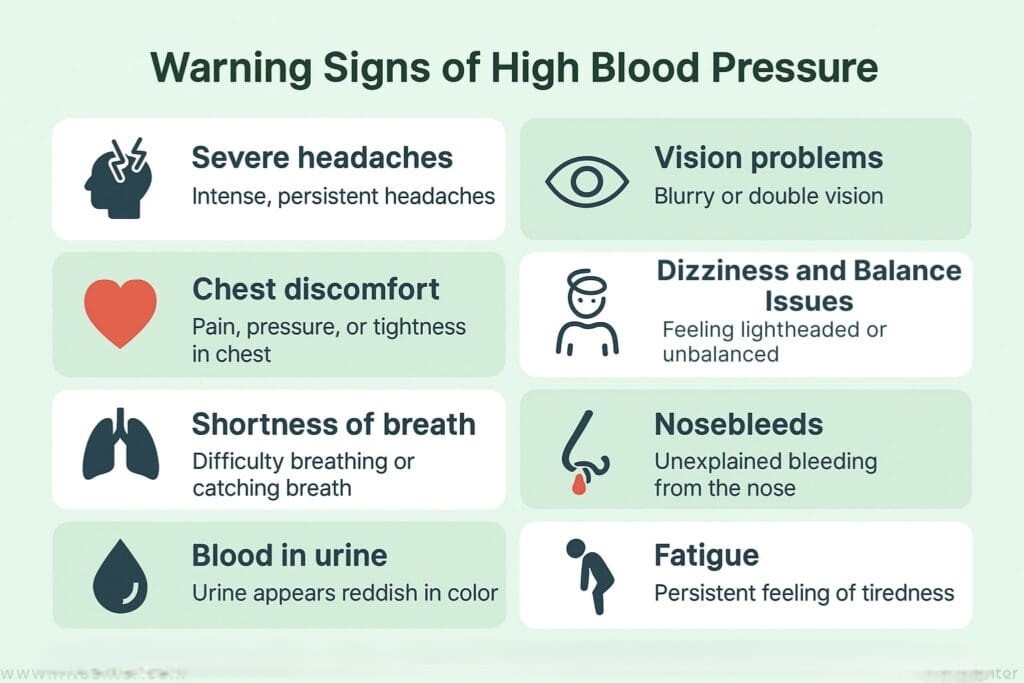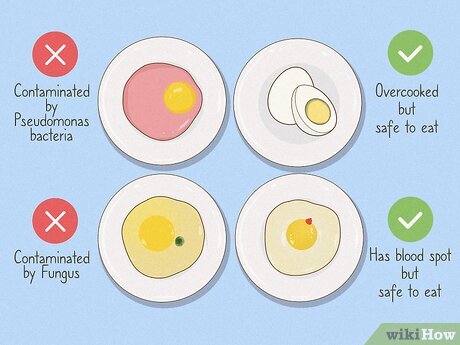Understanding Hypertension
Hypertension, commonly known as high blood pressure, is a condition where the force of the blood against the artery walls is consistently too high. Often referred to as the “silent killer,” hypertension can develop without any noticeable symptoms, making it particularly dangerous. If left unmanaged, it can lead to severe health issues such as heart disease, stroke, kidney failure, and vision loss.eMedicineHealth+1Institute for Functional Health+1
Recognizing the early signs of hypertension is crucial for timely intervention and prevention of long-term complications. This article delves into six warning signs that should never be ignored.
1. Persistent Headaches
The Connection Between Headaches and High Blood Pressure
Frequent headaches, especially those occurring in the morning or at the back of the head, can be an early indicator of hypertension. These headaches are often described as dull and throbbing and may be accompanied by dizziness or nausea.
Why It Happens
Elevated blood pressure can cause the blood vessels in the brain to stretch or constrict, leading to pain. Additionally, high pressure can increase intracranial pressure, resulting in headaches.
What to Do
If you experience frequent or severe headaches, it’s essential to monitor your blood pressure regularly. Consult a healthcare professional to determine the underlying cause and appropriate treatment.
2. Fatigue and Confusion
Feeling Unusually Tired
Unexplained fatigue, even after adequate rest, can be a sign of high blood pressure. Hypertension can reduce the efficiency of blood flow, leading to decreased oxygen and nutrient delivery to the body’s tissues, resulting in tiredness.
Mental Fog and Difficulty Concentrating
High blood pressure can affect cognitive functions, leading to confusion, memory issues, and difficulty concentrating. This is due to reduced blood flow to the brain, which impairs its ability to function optimally.
What to Do
Persistent fatigue and cognitive issues warrant a medical evaluation. Monitoring blood pressure and discussing symptoms with a healthcare provider can help in early diagnosis and management.
3. Blurred Vision
Vision Changes and Eye Strain
Hypertension can damage the small blood vessels in the eyes, leading to blurred vision or even vision loss. This condition, known as hypertensive retinopathy, occurs when high blood pressure causes the walls of the blood vessels in the retina to thicken, narrow, or rupture.
Retinal Damage Risk
Prolonged high blood pressure increases the risk of retinal damage, which can lead to permanent vision problems if not addressed promptly.
What to Do
If you notice sudden or frequent changes in your vision, consult an eye specialist immediately. Regular eye exams can help detect early signs of hypertensive retinopathy.
4. Shortness of Breath
Difficulty Breathing with Minimal Exertion
Experiencing shortness of breath during routine activities, such as climbing stairs or walking short distances, may indicate that high blood pressure is affecting your heart’s ability to pump blood efficiently.
Heart Failure Risk
Hypertension forces the heart to work harder, which can lead to the thickening of the heart muscle and eventually heart failure. Shortness of breath is a common symptom of this condition.
What to Do
If you experience unexplained shortness of breath, seek medical evaluation promptly. Early detection and management of high blood pressure can prevent progression to heart failure.
5. Chest Discomfort and Palpitations
Fluttering or Racing Heart
High blood pressure can cause irregular heartbeats, known as arrhythmias, leading to sensations of fluttering or a racing heart. These palpitations can be alarming and may indicate that the heart is under stress.
Chest Tightness or Pressure
Chest discomfort, tightness, or pressure can be a sign that hypertension is affecting the heart’s function. This symptom should never be ignored, as it may precede a heart attack.
What to Do
Immediate medical attention is necessary if you experience chest pain or palpitations. These symptoms could indicate serious cardiovascular issues requiring prompt treatment.
6. Frequent Nosebleeds
Sudden, Unexplained Nosebleeds
While nosebleeds can occur for various reasons, frequent and unexplained episodes may be linked to high blood pressure. Hypertension can cause the blood vessels in the nose to become more fragile and prone to bleeding.
Differentiating Causes
It’s important to distinguish between nosebleeds caused by environmental factors, such as dry air, and those resulting from hypertension. Persistent nosebleeds without an apparent cause should prompt a blood pressure check.
What to Do
If you experience regular nosebleeds, monitor your blood pressure and consult a healthcare provider to rule out hypertension as the underlying cause.
Bottom-Line: Early Detection Saves Lives
Hypertension often develops silently, but recognizing early warning signs can help prevent serious health risks. Regular blood pressure monitoring is essential, especially if you experience persistent symptoms. Lifestyle changes like reducing salt intake, staying active, and managing stress can help control blood pressure naturally.The Irish Sun
Stay proactive about your heart health—early detection and prevention are key!




